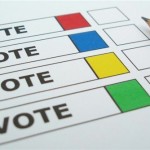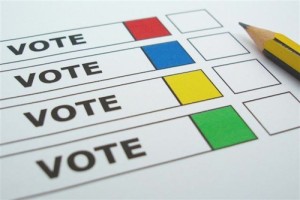Readers who voted in the non-scientific poll last week differ from those who took a recent Gallop poll, their summary:
This year, the housing market has been improving across the U.S., and home prices have recently been rising after a steep drop in 2007 during the subprime mortgage crisis. This current improvement in prices may be why more Americans now consider real estate the best option for long-term investments. In 2002, during the real estate boom that preceded the mortgage crisis and before gold was offered as an option in the question, half of Americans said real estate was the best investment choice.
Stock values have also been improving in recent years, aided particularly by the bull market in 2013. The 24% of Americans who regard stocks as the best long-term investment is also higher now, up from 19% in 2012. Still, Americans are modestly more likely to say real estate is the better investment today, perhaps because of the recent volatility in the stock market.
So right now Americans think real estate in the best long-term investment. Here are the results from readers:.
Q: Which of the following do you think is the best long-term investment?
- Stocks 27 [35.06%]
- Mutual funds 26 [33.77%]
- Real estate 15 [19.48%]
- Savings accounts/CDs 4 [5.19%]
- Gold 3 [3.9%]
- Bonds 2 [2.6%]
Real estate trailed in third. History isn’t on the side of home ownership as a means of long-term investing:
From 1890 — just three decades after the Civil War — through 2012, home prices adjusted for inflation literally went nowhere. Not a single dime of real growth. For comparison, the S&P 500 increased more than 2,000-fold during that period, adjusted for inflation. And from 1890 to through 1980, real home prices actually declined by about 10%. (USA Today: Why your home is not a good investment)
There are plenty of reasons to buy a home, but a long-term investment isn’t one of them, especially if you’re black:
Home ownership has been an important vehicle in creating a solid white middle class, but it has not done the same for most black homeowners, because blacks and whites buy homes in very different neighborhoods. Research shows that homes in majority black neighborhoods do not appreciate as much as homes in overwhelmingly white neighborhoods. This appreciation gap begins whenever a neighborhood is more than 10% black, and it increases right along with the percentage of black homeowners. Yet most blacks decide to live in majority minority neighborhoods, while most whites live in overwhelmingly white neighborhoods. (Forbes: How Home Ownership Keeps Blacks Poorer Than Whites)
The young are cautious about buying:
Young people have delayed life decisions, including moving for jobs, forming households, getting married and having children, said Peter Francese, an independent demographer and consultant in Exeter, New Hampshire.
“There is a lack of belief that there is something better in another state,” he said.
Slower household formation is lowering home ownership. Just 36.2% of Americans under 35 owned a home in the first quarter, compared with 41.3% in 2008’s first quarter, the Census Bureau reported April 29. (Financial Post: Young and unwilling to relocate: How Millennials may be holding back the U.S. labour and housing recovery)
Many in St. Louis still push for owner-occupied redevelopment, even though rental housing appears to be in greater demand for the foreseeable future. Besides the young, Baby Boomers entering retirement are faced with being home owners or renters:
Hopefully in the coming years those who rent housing won’t have the negative stigma expressed by home owners. I know many renters who are active in their neighborhoods.
— Steve Patterson

